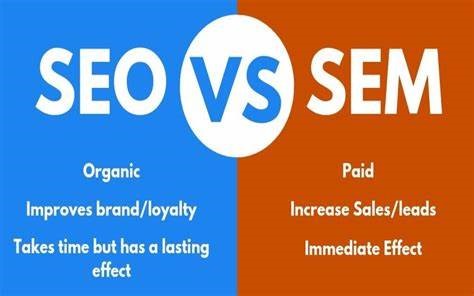
What Is the Difference Between SEM and SEO –
Search engine optimization (SEO) and search engine marketing (SEM) are two of the most widely used terms in the digital marketing industry. They are often used interchangeably, but they are actually two distinct practices that serve different purposes.
In this article, we will explore the differences between SEO and SEM.
What is SEO?
SEO is the process of optimizing a website and its content to improve its organic ranking on search engine results pages (SERPs). The goal of SEO is to improve the quality and relevance of a website’s content to make it more attractive to search engines like Google, Bing, and Yahoo.
SEO involves a variety of techniques, including keyword research, on-page optimization, off-page optimization, technical optimization, content optimization, and link building. Keyword research involves identifying the keywords and phrases that your target audience is searching for, and using them in your website’s content and structure.
On-page optimization involves optimizing the content and structure of a website to make it more relevant and appealing to search engines. This includes optimizing the content of individual pages by adding targeted keywords, optimizing images and videos, and creating high-quality, engaging content that attracts and retains visitors.
Off-page optimization, on the other hand, involves building high-quality links from other websites back to your site. This is done to increase the authority and relevance of your website in the eyes of search engines. The more high-quality links you have pointing to your site, the higher your website is likely to rank in search engine results.
SEO is a long-term strategy that requires ongoing effort and dedication to produce results. It can take several months to see significant improvements in organic search rankings, and the results are often not immediate or guaranteed.
What is SEM?
SEM, or search engine marketing, is the practice of promoting your website and its content through paid advertising on search engines like Google, Bing, and Yahoo. SEM involves creating ads that appear at the top or bottom of the search engine results pages, above or below the organic results. The goal of SEM is to drive more targeted traffic to your website, increase your visibility, and ultimately generate more leads and sales.
SEM involves creating and managing pay-per-click (PPC) advertising campaigns, which allow you to bid on specific keywords and phrases related to your business. When a user searches for a keyword that matches your bid, your ad will appear in the search results. You will only pay when a user clicks on your ad, hence the name pay-per-click. PPC advertising can be a highly effective way to drive targeted traffic to your website, but it can also be expensive and requires ongoing management and optimization.
In summary, the main difference between SEO and SEM is that SEO is focused on improving your website’s organic search rankings, while SEM is focused on promoting your website through paid advertising. SEO is a long-term strategy that requires ongoing effort and investment, while SEM can provide more immediate results but requires ongoing investment to maintain its effectiveness.
Both SEO and SEM can be effective strategies for driving traffic, generating leads, and increasing sales. The best approach for your business will depend on your specific goals, budget, and target audience. A comprehensive digital marketing strategy should incorporate both SEO and SEM, along with other tactics like social media marketing, content marketing, email marketing, and more, to create a well-rounded and effective online presence.
